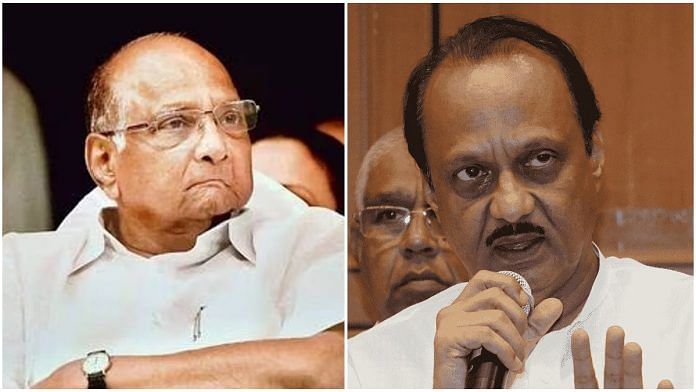New Delhi: The Supreme Court Tuesday made a crucial observation regarding the Election Commission’s (EC) approach to adjudicate the dispute between two factions of the Nationalist Congress Party (NCP).
A bench of justices Surya Kant and K.V. Vishwanathan wondered whether the “legislative majority test” applied by the EC to declare the Ajit Pawar group as the real NCP would amount to recognising a split in the party or defection, something that offends the Tenth Schedule or the anti-defection law.
The significant, albeit verbal remark, was made when the top court was hearing Sharad Pawar’s petition challenging the EC’s decision to recognise Ajit Pawar’s faction as the real NCP and allocating the clock symbol to it for electoral purposes.
The petition was accompanied with an application for interim order to restrain Ajit Pawar from using his uncle and the former NCP supremo’s face as well as the clock symbol in the forthcoming Lok Sabha election.
This is not the first time that the top court has raised eyebrows over the rationale adopted to settle intra-party disputes involving the question of which faction is the real party. In the Shiv Sena case, a bench led by Chief Justice D.Y. Chandrachud made a similar observation early this month.
While hearing a petition against the Maharashtra Assembly Speaker’s judgement that declared Chief Minister Eknath Shinde’s faction as the “real Shiv Sena”, the bench felt that the decision was against the SC judgement in the case. The decision did not appear to be “consistent” with its May 2023 judgement that was delivered in connection with the political imbroglio that toppled the Maha Vikas Aghadi government in Maharashtra, the top court had said.
On Tuesday, senior advocate Abhishek Manu Singhvi, appearing for the Sharad Pawar group, urged the bench to let none of the two NCP factions use the clock symbol. He said the new symbol of “trumpet” earmarked to his client is yet to be registered in the voters’ mind.
Moreover, the trumpet was not a reserved symbol and, thus, could be given to any other party or candidate, which would create further confusion, he said.
The clock symbol, the senior advocate said, is psychologically intertwined with Sharad Pawar and those who are his voters would not be able to differentiate if they are voting for him or for the Ajit Pawar group.
Singhvi briefly touched upon the EC’s order to question the basis on which it declared the Ajit Pawar group to be the real NCP and allot the clock symbol. He said that the poll panel solely went by the “legislative strength” and not “organisational majority.”
At this, Justice Vishwanathan pointed out that when the Election Symbols (Reservation and Allotment) Order was framed in 1968, the Tenth Schedule was yet to be enacted. The Tenth Schedule was later amended to remove the “ground of split” to defend defection and the only defence available now is “merger.”
“In that scenario, when the Election Commission is recognising a faction only on the basis of legislative strength and not organisational strength, is it not recognising a split, which is no longer approved under the Tenth Schedule? That way, you can engineer defections and claim the party symbol. Will it not be a mockery of the voter,” Justice Vishwanathan specifically asked senior advocate Mukul Rohatgi, who appeared for the Ajit Pawar group.
Justice Surya Kant concurred. “It is not what the Tenth Schedule has intended,” he added.
The anti-defection law, enshrined in the Tenth Schedule of the Constitution, was inserted in 1985 to prevent political defections.
Also Read: Why Maharashtra speaker declared Shinde faction the real Sena — ‘Legislative strength only aspect’
Partial relief for Sharad Pawar
Rohatgi submitted that there were no more factions as the EC had accepted the Ajit Pawar group as the official NCP. “There is only the NCP and a breakaway group, which is the Sharad Pawar supporters,” he told the bench.
However, the top court went ahead to issue a slew of guidelines, including asked Ajit Pawar to issue a public notice in newspapers in English, Marathi and Hindi editions, notifying that the allocation of the clock symbol is subjudice and that they are using it subject to the same final outcome of the judicial proceedings.
Such a declaration, the court ordered, shall be incorporated in every template, advertisement audio or video clip to be issued on the Ajit Pawar group’s behalf.
Further, in partial relief to the Sharad Pawar group, the top court allowed him to use ‘Nationalist Congress Party–Sharad Chandra Pawar’ to name his party and directed the EC as well as the State Election Commission to take necessary action to reserve the “trumpet” symbol for him and not allocate it to any other political party or independent leader.
Ajit Pawar was also directed to give an undertaking not to use Sharad Pawar’s name or pictures in their election posters. This, the court said, will apply not just to Maharashtra but also other states.
(Edited by Tony Rai)
Also Read: Why Election Commission’s order on dispute between NCP factions is a flashback of ‘Sena vs Sena’



